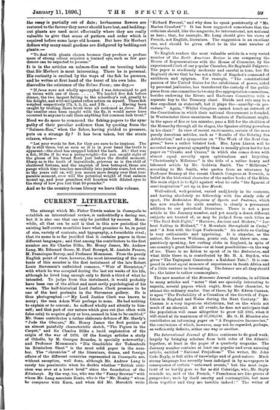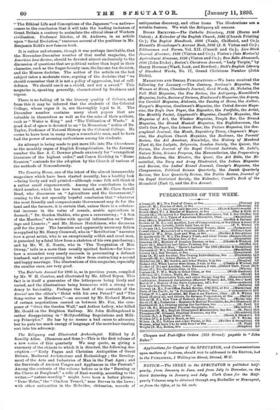CURRENT LITERATURE.
The attempt which Mr. Fisher Unwin makes in Cosmopolis to establish an international review, is undoubtedly a daring one, but it is also one that can only be justified by success. Mean- while, all that can be said is that in this new periodical the existing half-crown monthlies have what promisee to be, in point of size, variety of contents, and typography, a formidable rival ; that its name is so far justified that it contains papers in three different languages; and that among the contributors to the first number are Sir Charles Dilke, Mr. Henry James, Mr. Andrew Lang, Mr. Edmund Gosse, M. Paul Bourget, M. Anatole France, H. Francisque Sarcey, and Professor Idommsen. From the purely English point of view, however, the most interesting of the con- tents of this number is the first instalment of the late Robert Louis Stevenson's unfinished romance, " Weir of Hermiston," with which he was occupied during the last six weeks of his life, although he lived long enough only to finish a third of what he intended. To judge from this instalment, it would probably have been one of the ablest and most eerily psychological of his works. The half-historical Lord Justice Clerk promises to be one of the best portraits in the Stevenson gallery. He is thus photographed :—" My Lord Justice Clerk was known to many ; the man Adam Weir perhaps to none. He had nothing to explain or to conceal; he sufficed wholly and silently to him- self; and that part of our nature which goes out (too often with false coin) to acquire glory or love, seemed in him to be omitted." Mr. Gosse contributes a rather elaborate defence of Mr. Hardy's "Jude the Obscure," Mr. Henry James the first portion of an almost painfully characteristic sketch, "The Figure in the Carpet," and Sir Charles Dilke a lucid explanation of the origin of the war of 1870. Of the foreign articles a study of Othello, by M. Georges Brander, is specially noteworthy; and Professor Mommsen's " Die Geschichte der Todesstrafe im Romischen Start" is the most solid paper in the num- ber. The "chronicles " of the literature, drama, and foreign affairs of the different countries represented in Cosmopolis are, without exception, well done, although Mr. Andrew Lang is surely too pessimistic when he doubts whether "British criti- cism was ever at a lower level" since the foundation of the Edinburgh. By the way, too, who was the "Fanny Browne" with whom Mr. Lang associate Keats, who is the "Mr. Healey" whom he compares with Knox, and when did Mr. Meredith write `Richard Feverel," and why does he speak persistently of "Mr. Marion Crawford" ? It has been suggested somewhere that the criticism should, like the magazine, be international, not national as here ; that, for example, Mr. Lang should give his views of French, not English, literature. The suggestion is an excellent one, and should be given effect to in the next number of Cosmopolis.
To English readers the most valuable article in a very varied number of the North American Review is one comparing the House of Representatives with the House of Commons, by the experienced Clerk of our popular Chamber, Sir Reginald Palgrave. The paper is studiously moderate and careful in tone, but Sir Reginald shows that he has not a little of Bagehot'a command of antithesis and epigram. For example, " The constitutional passion of the United States for the subdivision of power, aided by personal jealousies, has transferred the custody of the public purse from one committee to twenty-five appropriation committees, besides endowing the Rivers and Harbours Committee with a separate key to the Treasury chest. Divide and rule may be a fine expedient in statecraft, but it plays the—anarC1iy-1:in pro- cedure." Again, "Whilst Congress cannot touch an datwork of the Constitution in which their national Government is founded, in Westminster three unanimous Members of Parliament might, in the space of five or ten minutes, pass a Bill for the abolition of the Monarchy through all its stages, the Speaker sitting' powerless in his chair." In view of recent excitements, certain of the more purely American articles, such as " Results of the' Behring Sea Arbitration," and a symposium on "The Work of the Next Con- gress," have a rather belated look. Mrs. Lynn Linton will be accorded more general sympathy than is usually given her for her paper on "Cranks and Crazes," in which she comes down with almost equal severity upon spiritualism and bicycling. " Christianity's Millstone " is the title of a rather . heavy and laboured article by Mr. Goldwin Smith. The ".Millstone," according to Mr. Smith, who quotes from an utterance by Professor Bonney at the recent Church Congress at Norwich, is belief in the historical character of the earlier books Of the Bible. His main object is to fight against what he calla "the figment of semi-inspiration " set up in Luz Mundi.
Well-edited, well-printed, varied andllively in -its contents, and having absolutely no fellowship with the shlidy side • of sport, The Badminton Magazine of Sports and Pastimes, which has now reached its sixth number, is clearly a 'permanent addition to our periodical literature. There is not a poor article in the January number, and yet nearly a dozen different subjects are treated of, as may be judged from such titles as "The Real Bull-Fight," "Harriers, Ancient and Modern," "Ice- boat Sailing in Holland," "A Mountain Stronghold' in Crete," and " A Run with the Cape Foxhounds." An article on Curling is very enthusiastic and appetising. It is singular, as the author, Mr. Lawson Williams, points out, that there are, com- paratively speaking, few curling clubs in England, In spite of our country's great facilities—or at least possibilitiee---in the way of ice. There is no fiction to speak of in the Badminton, and what little there is, is contributed by Mr. H. A. Bryden, who gives " The Tapinyani Concession: a Kalahari Tale.'3. It is com- posed in about equal measure of experiences in South-Africa and of a little venture in lovemaking. The former are all,they should
be; the latter is rather commonplace. •
The new number of the Economic Journal contains, in addition to many articles and " notes " that are specially interesting to experts, several papers which ought, from their character, to attract the ordinary reader. One of these, by Mr. Edwin Canaan, is upon " The Probability of a Cessation of the Growth of Popu- lation in England and Wales during the Next Century." Mr. Cannan is a very ingenious statistician, but on the whole not much of an alarmist. At all events, he does not anticipate that the population will cease altogether to grow till -1995, when it will stand at its maximum of 37,396,000. Mr. G. H. Blunden also contributes an informing paper on " A Progressive Income-tax," the conclusions of which, however, may not be regarded, perhaps, as sufficiently definite, either one way or another.
The International Journal of Ethics continues to do good work, largely by bringing scholars from both sides of the Atlantic together, at least in the pages of a quarterly magazine. The January number contains at least one popular and even amusing article, entitled " National Prejudices?' The writer, Mr. John Code Bayly, is full alike of knowledge and of good-nature. Much strong language has recently been indulged in by newspapers in consequence of certain " untoward events," but the most impa- tient of us hardly goes so far as did Coleridge, who, Mr. Bayly reminds us, said of the French, " Frenchmen are like grains of gunpowder; each by itself smutty and contemptible, but mass them together and they are terrible indeed !" The writer of
" The Ethical Life and Conceptions of the Japanese "—a native— comes to the conclusion that it will take the leading imitators of Great Britain a century to assimilate the ethical ideas of Western civilisation. Professor Ritchie, of St. Andrews, in an article upon " Social Evolution," traverses several of the positions in Mr. Benjamin Kidd's now famous book.
It is rather unfortunate, though it was perhaps inevitable, that the November-December number of that useful magazine, the American Law Review, should be devoted almost exclusively to the discussion of questions that are political rather than legal in their character, such as the Sugar-bounty case, the Income-tax decision, and the Monroe doctrine. The author of the article on the last subject takes a moderate view, arguing of the doctrine that " we should remember that it is not a policy of aggression, but of self- defence. We should use it as a shield, and not a sword." This magazine is, speaking generally, characterised by freshness and vigour.
There is no falling off in the literary quality of Colonia, and from this it may be inferred that the students of the Colonial College, whose organ it is, are thoroughly loyal to it. The December number contains many short papers that are valuable in themselves as well as for the sake of their authors, such as " Water is King " and " The Utilisation of Waste." A good deal of space is devoted to an " In Memoriam " notice of Dr. Taylor, Professor of Natural History in the Colonial College. He seems to have been in many ways a remarkable man, and to have had the power of arousing enthusiasm among his students.
An attempt is being made to put more life into The Churchman as the monthly organ of English Evangelicalism. In the January number the Rev. A. C. Downer pleads anxiously for "evangelical literature of the highest order," and Canon Bardsley in " Home Reunion" contends for the adoption by the Church of various of the methods of Nonconformity.
The Country House, one of the latest of the almost innumerable magazines which have been started recently, has a healthy look —being lively and well printed—although some folk will think it a rather small sixpenceworth. Among the contributors to the third number, which has now been issued, are Mr. Clare Sewell Read, who discourses on " Agriculture and the Government," coming to the not specially hopeful conclusion that " whatever the most friendly and compassionate Government may do for the land and the farmers, it is certain that, unless there is a substan- tial increase in the value of cereals, arable agriculture is doomed ; " Dr. Gordon Stables, who goes a caravanning ; " A Son of the Marshes," who writes with special information on " Bunt- ings and Linnets ; " and Mr. Horace Hutchinson, who discusses golf for the year The harmless and apparently necessary fiction is supplied by Mr. Henry Cresswell, who in " Retribution " narrates how a great artist, who is an exceptionally selfish and cruel man, is punished by a fatal blow from a skeleton of his own purchasing ; and by Mr. W. E. Norris, who in The Temptation of Mrs. Otway," tells in a more than usually spirited fashion—for him— how a scoundrel very nearly succeeds in personating a defunct husband, and so preventing his widow from contracting a second and happy marriage. The illustrations of this magazine, especially the smaller ones, are very good.



































 Previous page
Previous page